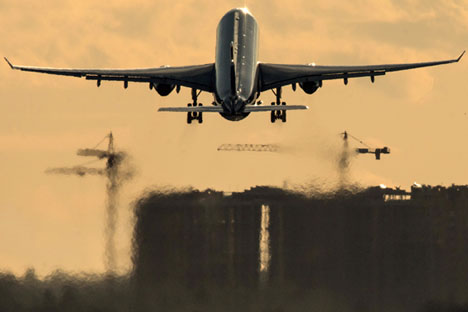
Flights between Moscow and Kiev were formerly one of the most popular requests on Russian online ticket-selling services.
Ria Novosti/Maxim BlinovForeign airlines are stepping into the gap left by Russian and Ukrainian carriers following the suspension of direct flights between the two countries on Oct. 25, meaning that while passengers still have options available, it is now impossible to get from Moscow to Kiev without a transfer.
Flights between the two capitals were formerly one of the most popular requests on Russian online ticket-selling services; about 100,000 passengers flew between Russia and Ukraine a month, according to data from Aviasales.
However, relations between the two countries are at an all-time low over Russia’s takeover of the Crimean peninsula in 2014 and its subsequent backing for pro-autonomy rebels in Ukraine’s eastern Donbass region, and the mutual suspension of direct flights is merely the latest in a series of tit-for-tat political and economical steps taken against each other by Kiev and Moscow.
According to Russia’s Federal Air Transport Agency, 800,000 people flew to Ukraine in the first three quarters of 2015.
"Regardless of the political situation, Kiev continues to be ranked as one of the most popular foreign destinations. It is not only, and not so much, about tourists, as it is about relatives and business partners," said Alexander Sizintsev, head of the Biletix online travel agency in comments to RBTH.
According to the estimates of analysts with Russian travel website Tutu.ru, the share of foreign carriers operating between Russia and Ukraine – Belavia, Turkish Airlines, LOT Polish Airlines, Air Baltic – amounted, until recently, to less than 1 percent of the total number of tickets purchased.
In recent days, however, their share has risen to almost 14 percent by sales date and to 25 percent by date of departure.
According to the market participants interviewed by RBTH, the main beneficiaries of this situation are the national airlines of Belarus (Belavia), Latvia (Air Baltic) and Moldova (Air Moldova).
Click to view the infographics
These carriers will divide a market worth 7-8 billion rubles per year ($112-128 million) – this is the total revenue of the Russian and Ukrainian companies from direct flights as assessed by Transport Minister Maxim Sokolov at the beginning of October.
"The Moldovan air carrier has some of the lowest fares and convenient connections – a total travel time of about four hours and a little more than 5,000 rubles ($80) for a one-way ticket," said Konstantin Parfyonenok from Andgo.travel.
Passengers will inevitably end up shouldering higher costs and looking at longer travel times, since the new alternatives involve a transfer in a third country, but as Roman Zakharov, chief editor of air travel magazine Liniya Polyota, pointed out, this is unlikely to deter travelers.
"Ticket prices from all the three carriers are 20-25 percent higher than direct flights. But, given the fact that the prices of train tickets are relatively high, these routes will be in demand," he said.
Zakharov pointed out that as soon as the suspension of flights was announced, these carriers announced that were are ready to serve Russian-Ukrainian transit routes through their hubs in Minsk, Chisinau, and Riga.
"The difficult situation is only in [the Ukrainian cities of] Dnipropetrovsk and Lviv, where there is not yet an alternative to direct communication with Russia," he said.
Other major European carriers also fly to Ukraine, for instance Lufthansa via Frankfurt and Munich, and Austrian via Vienna. However, they are unlikely to become a full-fledged alternative for passengers.
"These airlines have a higher price tag and a longer total flight time," said Parfyonenok, giving several examples: instead of 11,000-14,000 rubles ($175-223), a two-way ticket would cost 15,000-18,000 rubles ($240-290), while the travel time in each direction would be two to three hours longer than with Belavia and Air Moldova.
"With the same result, we can speak about flights via Amsterdam or Baku. But they are also likely to be less convenient for passengers," said Parfyonenok.
All rights reserved by Rossiyskaya Gazeta.
Subscribe
to our newsletter!
Get the week's best stories straight to your inbox